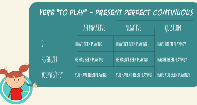Change Avatar
Subject Verb Agreement
Subject Verb Agreement
When writing a sentence, your subject and verb must always agree. Subjects are either singular or plural, and the verb must follow suit.
How Do You Make a Verb Plural?
It’s a little tricky - when the subject is singular, you add an -s to the verb. When the subject is plural, you remove an -s from the plural form of the verb.
In general, that’s the rule you follow.
Singular subject
The elephant drinks.
Plural subject
The elephants drink.
Subject-Verb Agreement
Like everything in the English language, there are rules to follow when making sure your subjects and verbs agree with each other. Here are 9 to follow:
1A phrase or clause between the subject and the verb does NOT change the number of the subject.
For example:
A basket of flowers balances on the windowsill.
Even though flowers is plural, it’s within a prepositional phrase, so it does NOT change the verb. Basket remains the singular subject, so the verb balances gets an -s.
The men who voted on the bills want a break.
The word bills appears right next to the verb want; however, bills is part of the dependent clause who voted on the bills, meaning it does not affect the verb. The subject of the sentence - men - tells us the verb should be want - without an -s.
2Indefinite pronouns as subjects have specific rules.
There are several rules to follow with indefinite pronouns, but they are still very standard.
• Singular indefinite pronouns take singular verbs (with an -s).
Examples: each, either, neither, one, no one, nobody, nothing, anyone, anybody, anything, someone, somebody, something, everyone, everybody, everything
• Plural indefinite pronouns take plural verbs (without an -s).
Examples: several, few, both, many
• Some indefinite pronouns rely on their clause to say which verb they take singular verbs (with an -s). If it is countable, then it takes a plural verb. If it is uncountable, then it takes a singular verb.
Examples: some, any, none, all, most
Some air blows in from the window.
Air is uncountable, so it takes a plural verb - blows.
Some toys litter the floor.
Toys are countable, so it takes a singular verb - litter.
3Compound subjects made with the word and are always plural.
You’re essentially talking about more than one thing when you join two nouns with and.
Example: A brownie and a cookie together make a brookie.
Brownie and cookie form a compound subject when joined with and.
Make is the plural form of the verb.
4Compound subjects made with either the word or or nor agree with the subject closest to it.
You aren’t talking about them as a pair, but as an alternative or option.
Example: Neither the teacher nor the students knew what time the assembly would begin.
Part of the compound subject - students - is closer to the verb, so it agrees with it in its plural form knew.
Either sprinkles or hot fudge can go on your sundae, but not both.
Part of the compound subject - hot fudge - is closer to the verb, so it agrees with its singular form can.
5Inverted subjects must agree with the verb.
What’s an inverted subject? When the subject doesn’t appear at the beginning of the sentence.
Examples:
• There are several artists who want to paint outside.
The subject in this sentence is artists - a plural subject that must agree with the plural verb are.
• How is your mother today?
The singular subject in this question is mother, so it agrees with the singular verb is.
6Collective Nouns - words that represent a group - may be singular or plural, depending on the meaning.
Words like group, class, team, or audience refer to a group of people, but can be seen as a single unit. But, when you pair that word with the name of the individuals in the group, then it becomes plural.
Example:
• The team celebrates after their win.
The subject is team functioning as a single unit, so the verb is a singular form with an -s.
• The team members celebrate after their win.
The subject here is actually team members, so it is plural and must have the verb celebrate agree.
7The title of a book, movie, or single entity like a country or organization is always singular, as it functions as one unit.
Here are some examples:
• Harry Potter and the Sorcerer’s Stone is my favorite book.
The title is for a single book, so the verb is the singular form of is.
• The American Library Association held its annual meeting this week.
The ALA is a single organization of lots of people, but it functions as a single unit, so it gets the singular verb held.
• The United States is represented by a flag of red, white, and blue.
The United States is a single country so it agrees with the singular verb is.
8Subjects naturally in their plural form have special rules depending on their meaning.
Sometimes a subject will be in its plural form, such as a disease like measles or a subject like mathematics. The verb agreement depends on the meaning, but they most often function in the singular form.
Example:
• Measles is a disease that can affect anyone.
Measles is the name of a disease, so it functions as a singular and takes the verb is.
• Mathematics is my favorite subject in school.
The mathematics in the exam were difficult.
Both subjects are plural form, but first takes singular verb is because the meaning refers to the subject as a whole. The second refers to the individual problems within an exam - more than one - so it takes a plural verb were.
Another weird one is when the word refers to more than one or has a plural meaning, such as pants or socks or scissors.
Example:
• My pants have a tear in the knee.
Pants has a plural meaning, so it takes the plural verb have.
• This pair of pants has a tear in the knee.
This is an example of the word pair functioning as a single unit, therefore taking the singular verb has.
9When a sentence has a subject and a subject complement, the verb always agrees with the subject.
This sounds complicated, but it isn’t, however many people mess this one up in writing and speech.
Example:
My favorite dessert is cookies.
Even though the subject complement is plural - cookies - the subject dessert is singular, and the verb must agree - is.
But when we reverse it and make the subject complement the subject, the verb must agree with its plural form:
Cookies are my favorite dessert.
10There are always some exceptions, but think about the meaning you mean to convey.
When you focus on the meaning of the subject and the message you want to convey, you’ll know what verb form to use!
Examples of oddballs:
• A number of books were left behind at the library.
A number looks like it should be singular, but actually has a plural meaning, so the verb must be plural.
• Every boy grows taller in his teenage years.
Every might throw you off, but it refers to an individual, so the verb must be singular.
It can be complicated, but as long as you know the meaning you wish to convey, your subjects and verbs will be in agreement!










